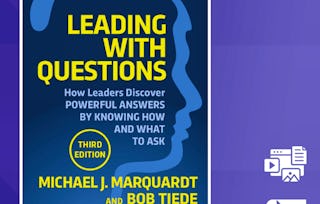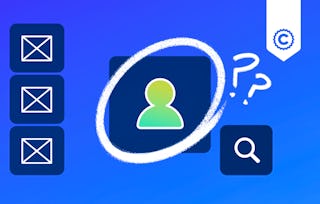The main purpose of this course is to focus on good questions and how to answer them. This is essential to making considered decisions as a leader in any organization or in your life overall. Topics will include the basis of human curiosity, development of questions, connections between questions and approaches to information gathering design , variable measurement, sampling, the differences between experimental and non-experimental designs, data analysis, reporting and the ethics of inquiry projects. Emphasis will be placed on approaches used in the social sciences (i.e., sociology, psychology, anthropology), but we will also discuss how others (i.e., natural scientists, business analysts) might approach the inquiry process. No prior knowledge of statistics is required for this course.

Research Design: Inquiry and Discovery

459 reviews
Skills you'll gain
Details to know

Add to your LinkedIn profile
See how employees at top companies are mastering in-demand skills

There are 4 modules in this course
This module will focus on the process of inquiry and how that will be used as a systematic model in seeking answers and solving problems. Next, we turn to components essential to each of the inquiry approaches.
What's included
7 videos17 readings1 assignment1 discussion prompt
In this module, we will consider how to develop questions or hypotheses. This process begins with conceptualization or the mental process where fuzzy and imprecise concepts are made more specific and precise.
What's included
3 videos8 readings1 assignment
In this module, we will look at the essential components of a literature review. The purpose is both to gain a good understanding of the main sources of information concerning a particular topic or question and to clarify our inquiry objective, hypothesis and/or research question.
What's included
3 videos4 readings1 assignment1 peer review
This module will explore the importance of reliability and validity. We will also focus on ethical issues encountered with research.
What's included
3 videos16 readings1 assignment
Prepare for a degree
Taking this course by University of North Texas may provide you with a preview of the topics, materials and instructors in a related degree program which can help you decide if the topic or university is right for you.
Instructor

Offered by
Explore more from Personal Development
 Status: Free Trial
Status: Free TrialUniversity of Minnesota
 Status: Preview
Status: PreviewJohn Wiley & Sons
 Status: Free Trial
Status: Free TrialUniversity of California San Diego
 Status: Free Trial
Status: Free Trial
Why people choose Coursera for their career

Felipe M.

Jennifer J.

Larry W.

Chaitanya A.
Learner reviews
- 5 stars
81.91%
- 4 stars
14.59%
- 3 stars
1.96%
- 2 stars
0.65%
- 1 star
0.87%
Showing 3 of 459
Reviewed on Aug 16, 2020
Very nice experience, i suggest each and every students to complete this course you will surely get something to learn from here. Thanku shoolini university to provide me this course...
Reviewed on Mar 10, 2021
Great type of learning for an man at work most of the day and dad by night. This class is meant for people like me.
Reviewed on Jan 13, 2021
Thanks for sharing this meaningful information. I am excited to begin my research projects.

Open new doors with Coursera Plus
Unlimited access to 10,000+ world-class courses, hands-on projects, and job-ready certificate programs - all included in your subscription
Advance your career with an online degree
Earn a degree from world-class universities - 100% online
Join over 3,400 global companies that choose Coursera for Business
Upskill your employees to excel in the digital economy
Frequently asked questions
To access the course materials, assignments and to earn a Certificate, you will need to purchase the Certificate experience when you enroll in a course. You can try a Free Trial instead, or apply for Financial Aid. The course may offer 'Full Course, No Certificate' instead. This option lets you see all course materials, submit required assessments, and get a final grade. This also means that you will not be able to purchase a Certificate experience.
When you enroll in the course, you get access to all of the courses in the Specialization, and you earn a certificate when you complete the work. Your electronic Certificate will be added to your Accomplishments page - from there, you can print your Certificate or add it to your LinkedIn profile.
Yes. In select learning programs, you can apply for financial aid or a scholarship if you can’t afford the enrollment fee. If fin aid or scholarship is available for your learning program selection, you’ll find a link to apply on the description page.
More questions
Financial aid available,
¹ Some assignments in this course are AI-graded. For these assignments, your data will be used in accordance with Coursera's Privacy Notice.

